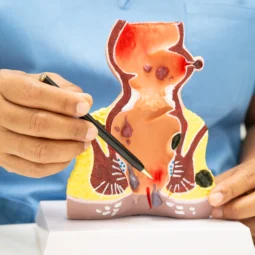Are you or is someone you know struggling with diabetes? Statistics show it’s very likely. One in 10 Portlanders suffers from the ailment and the number is expected to double or triple by 2050, if trends continue.
Diabetes is a group of diseases that cause high blood-sugar levels, leading to an inability to produce or effectively utilize the body’s insulin. There is no such thing as “mild diabetes,” as Types 1 and 2 and gestational diabetes can lead to serious complications affecting the heart and blood vessels, eyes, kidneys, nerves and teeth.
The good news is many cases of diabetes can be managed with lifestyle changes, including a healthy diet and plenty of exercise, as well as prescribed medical treatments such as taking insulin and tracking glucose levels. The National Institute of Diabetes and Digestive and Kidney Diseases has designated November as National Diabetes Month. Throughout November, doctors and nurses at The Portland Clinic want to help shine a light on preventive measures you can take to avoid the disease, as well as treatment options for those facing the challenges of diabetes.
There are three main types of diabetes, each with similar complications but emerging from very different causes.
Type 1 diabetes, formerly known as juvenile diabetes, is usually caused by an autoimmune disorder in which the body is unable to produce insulin. This can affect people at any age, but is most commonly developed in children and young adults, with only five percent of cases being diagnosed in adulthood. Type 1 diabetes requires regular doses of insulin to control blood-sugar levels, and currently has no cure.
Type 2 diabetes is the most common of the three, affecting 90 percent of people with diabetes. Type 2 occurs due to an insulin resistance, leading to a deficiency. This type of diabetes is often associated with overweight or obese individuals and is most frequently diagnosed after the age of 45, but is still a threat to patients of all ages. In some cases, insulin is required, but more often than not, Type 2 can be managed through proper exercise, a healthy diet and other medications.
Gestational diabetes occurs in about three to five percent of pregnancies, but is not necessarily correlated with pre- or post-pregnancy diabetes, and does not automatically mean the baby will develop the disease after birth. The treatment plan varies between individuals, but usually includes monitoring glucose levels, maintaining a healthy lifestyle and possible insulin injections. A woman’s blood-sugar levels should return to normal after giving birth, but her risk of developing Type 2 diabetes in the future is increased.
In addition to the three types of diabetes outlined above, there is also prediabetes.
Prediabetes occurs when an individual’s blood-sugar levels are higher than normal, but not high enough to classify as diabetes. Without proper lifestyle changes and medical treatment, a prediabetes diagnosis may lead to Type 2 diabetes, heart disease and stroke. Fortunately, prediabetes is reversible with long-term lifestyle changes.
What are the symptoms?
Symptoms of diabetes vary depending on the type, but there are some universal warning signs. These include:
- Increased urination frequency
- Weight loss
- Blurred vision
- Fatigue
- Excessive thirst
- Slow healing sores or frequent infections
- Tingling or numbness in hands and feet
- Red, swollen or tender gums
It is important to take your body’s hints seriously. If you experience any of these symptoms and are worried about your health, reach out to The Portland Clinic for a consultation.
Each November, the National Diabetes Education Program picks a theme for the month to highlight a different aspect of diabetes and help get people involved in awareness efforts. 2017’s theme is “You Are the Center of Your Diabetes Care Team.” It starts with you. Listen to your body and advocate for yourself by seeking out support from the medical community, family and friends. The Portland Clinic is here to help by answering any questions you may have, consulting, diagnosing and treating fellow Portlanders. You may be the center of your care team, but you are not alone.
Whether you’re suffering from diabetes, at high risk for developing the disease or are simply looking to engage in a healthier lifestyle, your provider and nurses at The Portland Clinic are available to consult, diagnose and treat our neighbors. We encourage any patients with questions or concerns regarding nutrition, a new fitness routine or diabetes treatment to contact The Portland Clinic. You can make an appointment by calling 503-223-3113 or visiting ThePortlandClinic.com.


